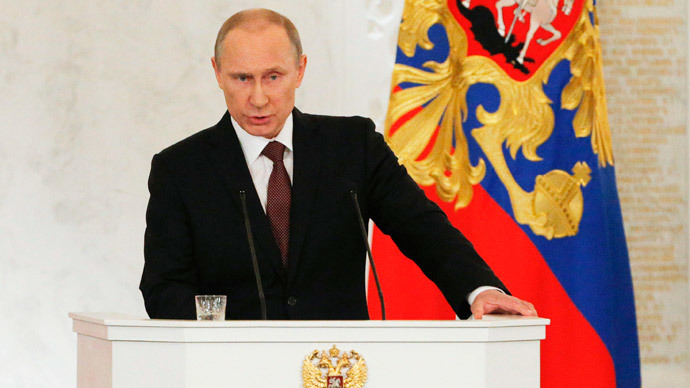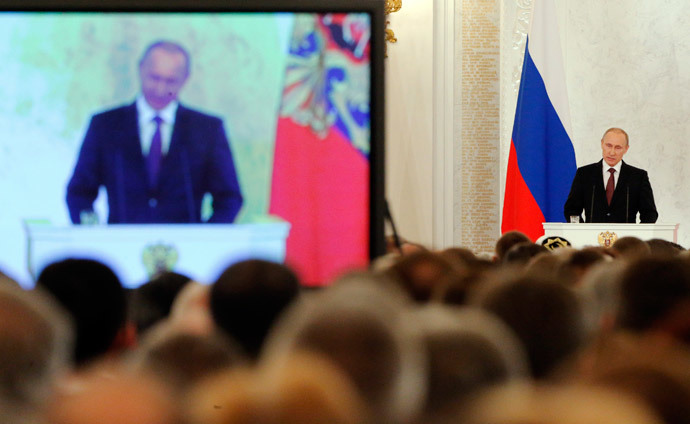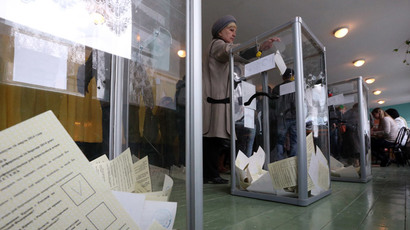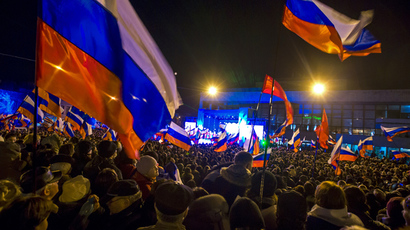Putin: Crimea similar to Kosovo, West is rewriting its own rule book

Crimea’s secession from Ukraine was just like Kosovo’s secession from Serbia, and any arguments otherwise are just attempts to bend the West-advocated rules that were applied to the Kosovo case, Russian President Vladimir Putin said.
The statements came as Putin was addressing the Russian parliament to convince lawmakers to ratify a treaty, which would make Crimea part of the Russian Federation.
In the speech he challenged Washington’s position, which says that Kosovo was a unique case and could not justify any other move towards independence in the world.
“Our western partners created the Kosovo precedent with their own hands. In a situation absolutely the same as the one in Crimea they recognized Kosovo’s secession from Serbia legitimate while arguing that no permission from a country’s central authority for a unilateral declaration of independence is necessary,” Putin reminded, adding that the UN International Court of Justice agreed to those arguments.
“That’s what they wrote, that what they trumpeted all over the world, coerced everyone into it – and now they are complaining. Why is that?” he asked.
PUTIN: #Crimea similar to #Kosovo, West is rewriting its own rule book. WATCH LIVE http://t.co/200Vx0Kh8dpic.twitter.com/84qzEJQaUM
— RT (@RT_com) March 18, 2014
Putin dismissed the argument that Kosovo was unique due to the large number of victims during the Balkan wars and the dissolution of Yugoslavia.
“It’s beyond double standards,” Putin said. “It’s a kind of baffling, primitive and blatant cynicism. One can’t just twist things to fit his interests, to call something white on one day and black on the next one.”
The president dismissed the allegations that Russia is violating international law with its actions in Ukraine.
“Well’ it’s good that they at least recalled that there is international law. Thank you very much. Better late than never,” Putin said adding that in fact nothing of this kind happened.
Watch President Putin's speech in full
‘In Ukraine the West crossed the red line’
In fact, it was Russia that defended international law and its institutions, while western countries have been diminishing them. The situation in Crimea is just a reflection of this broader process, which has been happening for decades now.
“In the practical application of policies, our western partners – the United States first and foremost – prefer to be guided not by international law, but by the right of strength. They believe in their exceptionalism, that they are allowed to decide on the fate of the world, that they are always right,” Putin charged.
This disregard to rule of law was evident in Yugoslavia in 1999, when NATO bombed the country without a UN Security Council mandate, the Russian president said. There was Afghanistan, Iraq and the perversion of the UNSC resolution on Libya, when instead of imposing a no-fly zone NATO bombed the country into submission.
There were also orchestrated “colored revolutions” in Europe and the Arab World, which cynically used the feelings of people tired with corruption and poverty. The latest Ukrainian events are just the latest of such actions, and Russia’s willingness to seek dialogue and compromise was stonewalled again, Putin said.

“They were cheating us once more, took decisions behind our back, presented us with a fait accompli,” he said, adding that the patter is identical to that which accompanied NATO’s expansion to the east, the deployment of an anti-ballistic missile system, visa restrictions and numerous other issues.
“They are constantly trying to corner us in retaliation for our having an independent position, for defending it, for calling things by their names and not being hypocritical,” Putin accused. “Everything has its limits, and in Ukraine our western partners crossed the red line. They acted brutally, irresponsibly and unprofessionally.”
Putin said the West must stop being hysterical, restrain from the Cold War rhetoric and admit the obvious: “Russia is an independent and active participant of international relations. Just like any nation it has national interests that must be taken into consideration and respected.”
As for the Ukrainian red line, the coup-imposed authorities in Kiev voiced their desire to join NATO, and such a move would pose an imminent threat to Russia, Putin said.
“We stand against having a military organization meddling in our backyard, next to our homeland or in the territories that are historically ours. I just cannot imagine visiting NATO sailors in Sevastopol,” he stressed. “Most of them are fine lads, by the way. But rather let them visit us in Sevastopol than the other way around.”
At the end of his speech, Putin announced the submission to parliament of a draft federal law which would incorporate Crimea and the City of Sevastopol into Russian territory, as well as a request to ratify an international treaty with the government of Crimea to make this happen. He said he was sure of the legislature’s support for both documents.














